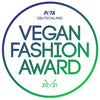Vegan Fashion Award 2021 from PETA for NINA REIN!

As part of the Vegan Fashion Award 2021, which NINA REIN received for the best business outfit this November, Julia and Susanne answer some questions about vegan fashion and sustainable living.

How does NINA REIN differ from other companies when it comes to vegan fashion?
Susi: With our fashion, we want to create sustainable statement pieces that make women feel comfortable and chic, with a clear conscience included. We like to use animal-free materials, and it is important to us not to use plastic. Plastic often ends up in the sea, including when washing clothes, where many animals also live that are neither happy about oil drilling for the textile industry nor about plastic, microplastics, etc.
Julia: We choose our materials for our clothing consciously. For us, design, function and a small ecological footprint are in harmony. Vegan clothing made from natural materials that are sustainably processed has an excellent ecological cycle, which is particularly environmentally friendly and important for us as a clothing manufacturer/designer brand.
You are increasingly focusing on vegan collections – why? Was there a reason for this?
Susi: We take a holistic approach in which we make sure not to harm people, animals or the environment. I now eat a vegetarian diet, but I would not tell our customers that they have to dress vegan. We offer vegan clothing and are happy that our customers accept it. They like to wear high-quality fabrics made from natural materials. Lyocell is very popular with us and is a resource-saving material. Items made from organic cotton are also very popular. So there is every reason to expand the collection in this direction.
Julia: We make clothes for women and every woman has her own needs, we are all the same in that respect 😉. We are not only developing as a brand, but also personally. This of course influences the collection and the choice of materials. I like to be guided by statistics and understandable educational campaigns. A vegetarian and vegan lifestyle has a much better ecological footprint, which convinces me to follow this path as best as I can. And preferably in all areas of my life, including my working world, sustainable business fashion.
Which vegan materials do you mainly use in your collections?
Susi: We use lyocell, linen, organic cotton, corozo and metals or paper. Some of our garments contain wool, but sometimes there are components that the customer doesn't even see that have an animal origin.
What do you have to consider when working and sewing with natural materials?
Julia: Natural materials are more sensitive to processing than polyester. They shrink when washed or steamed, for example, and this must be taken into account when cutting and sewing. With our vegan items, we have to ask very carefully whether no animal components are used in the fabric development. Colors or glue can contain elements of animal origin, in which case they are no longer vegan items for us. Every detail, including the buttons, must then be vegan, but here too we avoid plastic. There are alternatives, such as corozo, which is broken down and does not end up in the sea as microplastics.
Do you also notice a trend where vegan clothing is becoming more in demand?
Susi: We see a trend towards more and more vegan products, including in fashion. Vegan materials have many advantages and make up a large part of our collection. However, we focus on the "total package" of the garment. Because clothing has to impress with its design and functionality, it is not enough to just fulfill one feature. That is why we offer different materials that cover/withstand different needs in professional life.









